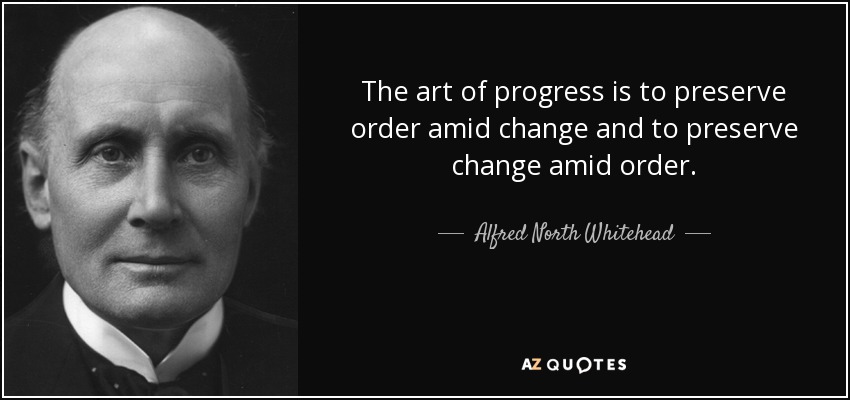 |
| Alfred North Whitehead, British Mathematician, Metaphysical Cosmologist |
Alfred North Whitehead Quotes
Alfred North Whitehead, (15 February 1861 – 30 December 1947) was an English mathematician and philosopher. He wrote on algebra, logic, foundations of mathematics, philosophy of science, physics, metaphysics, and education. Whitehead supervised the doctoral dissertations of Bertrand Russell and Willard Van Orman Quine, thus influencing logic and virtually all of analytic philosophy. He co-authored the epochal Principia Mathematica with Russell and later the metaphysical treatise Process and Reality.
“If you went in search of it, you would not find the boundaries of the soul, though you traveled every road—so deep is its logos.—Heraclitus“Thoughts are an independent power, continuing to act on their own, growing in such a way that they restrain their own mother (the soul).”—Schelling“The account of the sixth day should be written, He gave them speech, and they became souls.”—Whitehead
What is morality in any given time or place? It is what the majority
then and there happen to like and immorality is what they dislike.
- Alfred North Whitehead
In a certain sense, everything is everywhere at all times. For every location involves an aspect of itself in every other location. Thus every spatio-temporal standpoint mirrors the world. - Alfred North Whitehead
Not ignorance, but ignorance of ignorance, is the death of knowledge.
- Alfred North Whitehead
The real history does not get written, because it is
not in people's brains but in their nerves and vitals.
- Alfred North Whitehead
If a dog jumps into your lap, it is because he is fond of you; but
if a cat does the same thing, it is because your lap is warmer.
- Alfred North Whitehead
What we perceive as the present is the vivid
fringe of memory tinged with anticipation.
- Alfred North Whitehead
Each human being is a more complex structure
than any social system to which he belongs.
- Alfred North Whitehead
Philosophy begins in wonder. And, at the end, when
philosophic thought has done its best, the wonder remains.
- Alfred North Whitehead
“Philosophy is akin to poetry,
where both seek to express that ultimate good sense
which we term civilization. In each case there is reference
to form beyond the direct meanings of words.
Poetry allies itself to metre [to music!],
[as] philosophy [does] to mathematical pattern.”
– Alfred North Whitehead, Modes of Thought, 174
I consider Christian theology to be one of
the great disasters of the human race.
- Alfred North Whitehead
- Alfred North Whitehead
The mentality of mankind and the language of mankind created each other. If we like to assume the rise of language as a given fact, then it is not going too far to say that the souls of men are the gift from language to mankind. The account of the sixth day should be written: He gave them speech, and they became souls. - Alfred North Whitehead
We think in generalities, but we live in detail.
- Alfred North Whitehead
When you're average, you're just as close
to the bottom as you are the top.
- Alfred North Whitehead
Art flourishes where there is a sense of adventure.
- Alfred North Whitehead
I consider Christianity to be one of the great disasters
of the human race... It would be impossible to imagine
anything more un-Christian-like than theology.
- Alfred North Whitehead
The worship of God is not a rule of safety - it is an
adventure of the spirit, a flight after the unattainable.
- Alfred North Whitehead
Error is the price we pay for progress.
- Alfred North Whitehead
God is in the world, or nowhere, creating continually in us and around us. Insofar as man partakes of this creative process does he partake of the divine, of God, and that participation is his immortality. - Alfred North Whitehead
















